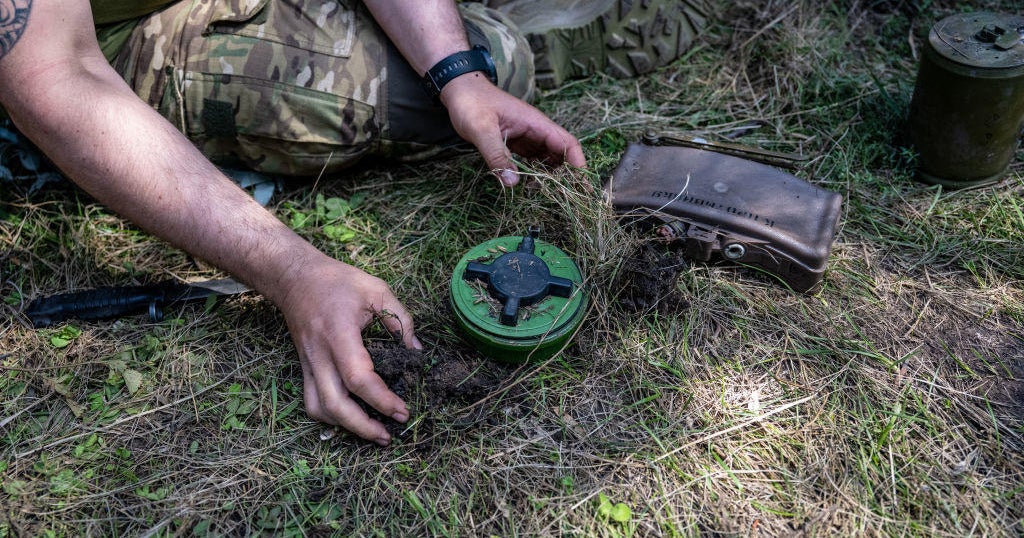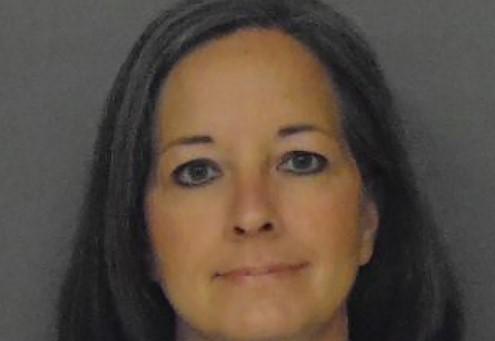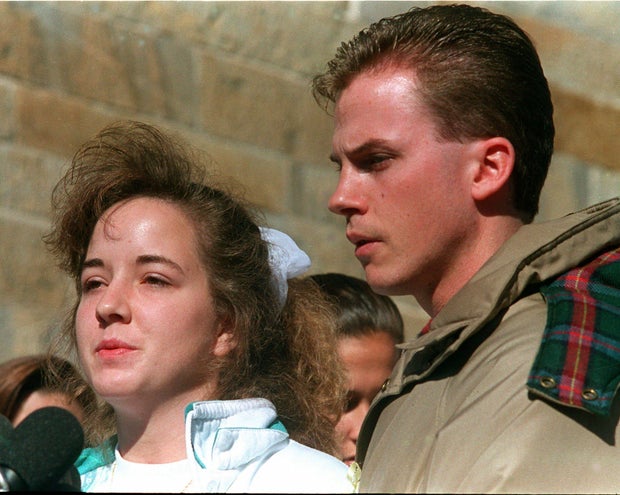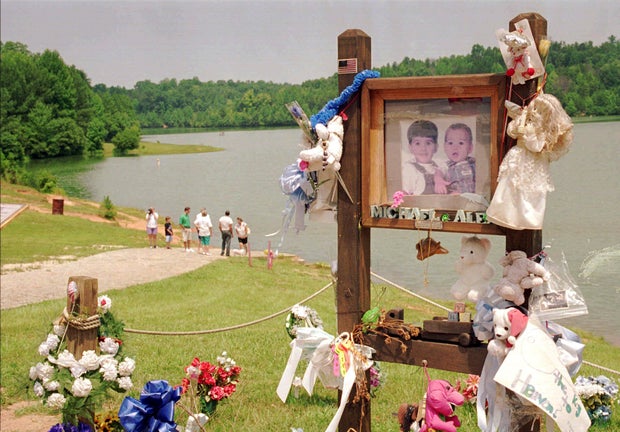CBS News
Massive Ukrainian effort underway to clear millions of landmines spread across country
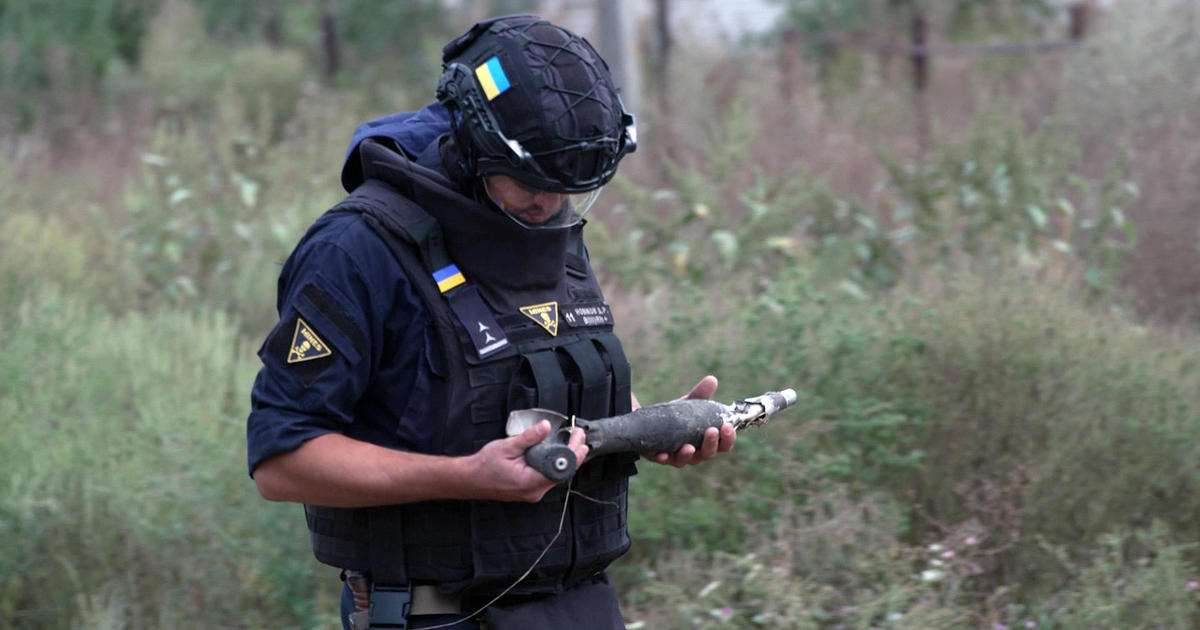
No matter how Russia’s war in Ukraine ends, Dr. Yuriy Kuznetzov will be battling Vladimir Putin’s madness for years. Kuznetzov is a Ukrainian surgeon and a national hero who stayed beside his patients as they were attacked. Now, heroism is a virtue that must endure. His city was liberated, but Dr. Kuznetzov sees victims every week or so — civilians who step on one of the millions of Russian landmines across about a third of Ukraine. There’s a massive effort to clear the mines but that will take a generation or more. Until then, there will be Dr. Kuznetzov with healing hands and eyes that have seen too much.
Half his life he’s devoted to Central Hospital and here in its basement, with Putin’s bombs overhead, all he’d become in 52 years was laid down in service to his home.
Dr. Yuriy Kuznetzov (translation): We didn’t imagine, until the end, that Russia would attack our country. When you’re sitting in a basement at night and a plane is flying over you, it was impossible to predict whether you would wake up to see another day.
In 2022, the basement became Dr. Kuznetzov’s operating room. That’s him dressed in white. The wounded were endless—a close friend’s wife he could not save and this man, who was shot, and lived.
Scott Pelley: Did you save more patients than you lost?
Dr. Yuriy Kuznetzov (translation): We saved significantly more people, definitely.
60 Minutes
Scott Pelley: Many of your colleagues evacuated and you did not. I wonder why you stayed.
Dr. Yuriy Kuznetzov (translation): When you have patients and you’re the only doctor or the only person who can treat them, I didn’t understand how you could leave.
He could not leave Izium. His city of 40,000 was occupied for six months. The Russians laid landmines here as they ran from Ukraine’s counterattack. Putin’s unprovoked war on an innocent people destroyed 80% of Izium and killed 1,000, leaving apartment buildings cleaved in two and this school, built in 1882, a hollow corpse.
The people of Izium clothe themselves in liberation and yet, they are not entirely free.
Demining teams are still fighting Russia here. Izium, 20 miles from the front, is one of the worst areas for mines and unexploded ordnance. Throughout Ukraine, more than 1,000 civilians have been wounded by mines. Lidia Borova, a 70-year-old widow, was picking mushrooms in a forest.
Lidia Borova (translation): I turned by the tree and then there was an explosion. I looked [down] at myself and I was bleeding, my arm was injured, my leg was injured. I was losing strength.
Her right foot and ankle were ripped away.
60 Minutes
Dr. Yuriy Kuznetzov (translation): First of all, the most difficult thing, is to persuade a patient that their leg needs to be amputated. It’s very difficult to explain to them that the leg is no good, no good to use
He told us a prosthetic is ultimately easier to live with.
Lidia Borova (translation): Dr. Kuznetzov saved me. I didn’t realize how much blood I lost. I don’t know how I managed to survive.
Ihor Bogoraz was with his wife in their garden. They found 12 mines. But there were 13.
Ihor Bogoraz (translation): I decided to mow the weeds. And one [mine] was under my foot. I stepped on it and it exploded instantly. And that’s it – no leg.
Serhii Nikolaiv was walking in leaves from the autumn while uncovering grapevines for the spring.
Serhii Nikolaiv (translation): If it had been green, I would have noticed it. But it was brown – I didn’t see it. It blended in with the leaves. I stepped on it. And I knew right away.
60 Minutes
Dr. Yuriy Kuznetzov (translation): The majority are those who stepped on “Petal” [mines] or anti-personnel mines – the person who invented them was an evil genius because they only weigh [two ounces] but what they can do when triggered is terrifying.
Petal mines, 5 inches long, flutter from aircraft by the thousands, like flower petals. Eleven pounds of pressure will set them off.
Vasyl Solyanik found them on his roof and in his garden.
Vasyl Solyanik (translation): There’s 18 here, but in all, there were over 50.
He showed us his video. That’s a petal mine right there. They are so common that we were told the story of a 70-year-old woman who gathered them in a basket and took them to a police station.
Vasyl Solyanik (translation): There’s some left in the bushes over here, so don’t walk around there.
He dialed 101 and emergency services sent deminers Ivan Shepelev and Ihor Ovcharuk.
Ihor Ovcharuk (translation): We encounter every type of munition – anti-infantry and anti-tank mines, mortars, artillery shells, [rockets]. It’s all here.
At Solyanik’s home, a sweep revealed an unexploded cluster bomb. Those are tricky. So they blew it in place.
60 Minutes
Ivan Shepelev told us, as the Russians fled, they also left boobytraps.
Ivan Shepelev (translation): We have seen cases, unfortunately, where explosives were found in civilian homes.
Ihor Ovcharuk (translation): My [team] also had to work on removing our dead Ukrainian soldiers whose bodies had been mined.
In 2022, Ihor Ovcharuk’s kneecap was shattered when a fellow deminer stepped on a mine and lost his foot.
Ivan Shepelev (translation): We know every explosive we remove means that someone’s life is saved.
A few weeks after our visit, a Russian missile wrecked the fire station where they’re based. Some were injured but not Shepelev or Ovcharuk.
Scott Pelley: What is the scope of the mine threat in Ukraine?
Pete Smith: I think the scope is unrecognizable in modern times.
Pete Smith heads demining here for the HALO Trust, a charity founded in 1988 to demine warzones. Smith was 33 years in the British army and awarded by Queen Elizabeth for disarming an IRA timebomb in a train station. Today, he says, Ukraine is the most heavily mined country.
Pete Smith: In some areas, the minefields are three or four mines deep, in areas, maybe a dozen mines deep. But that’s just the first line of defense. Then, several kilometers behind that, there are other layers of– of minefields, as well.
Smith took us to a farm sown with Russian anti-tank mines. You have to step carefully. Right there, in the center, is a mine packed with 17 pounds of high explosive. With three weeks of training behind her, Yulia Yaroshchuk was probing for any tripwire that would detonate a mine near her. She threaded the grass… feeling for the slightest resistance. Only the day before, a HALO deminer was killed and two were wounded in another part of Ukraine.
60 Minutes
Scott Pelley: Doing this by hand with that wand, it seems to me that you have an awfully big field to cover.
Yulia Yaroshchuk (translation): Well, of course. It will be a very long process. As far as I know, it will take many, many years. Each day [of war] means years of de-mining.
Scott Pelley: Why do you do this work?
Yulia Yaroshchuk (translation): I didn’t have to do it. I wanted to do it. this is my contribution to victory.
Scott Pelley: Will Ukraine ever be without mines?
Pete Smith: I think what I have seen in my time in Ukraine is the innovation, the patriotism, and just the sheer will of the people, that I’m confident that they will be able to remove the last mine from Ukraine.
Scott Pelley: Does this war make any sense to you?
Serhii Nikolaiv (translation): Not to a single person here, or anywhere. What kind of mind? What kind of moron or idiot do you have to be to even wish something like this on your enemies? You can’t. Even now, someone could drop a fork or a spoon and it makes a loud noise. And in your soul, you feel pain, and bitterness, and fear. It’s a real horror. [my sister-in-law] was ripped apart by a mine in front of her children. In front of their eyes.
Of all of Vladimir Putin’s war crimes in Ukraine, one was the bombing of Izium’s Central Hospital.
Dr. Yuriy Kuznetzov (translation): After this part of the hospital was damaged, a lot of medical services simply became unavailable. Here we had both intensive care and three operating rooms.
When Yuriy Kuznetzov was 14 years old, his grandmother died in his arms. He told us that’s why he became a doctor. And we suspect that’s why he stayed through the bombardment and occupation and the battle of the mines.
Scott Pelley: When a town loses its hospital, it doesn’t just lose the medical care – it loses hope.
Dr. Yuriy Kuznetzov (translation): The best praise for me was when a woman told me in April of 2022 that “when we heard the hospital was still open, we realized that our town had hope, it could withstand, survive, and [have a] future.”
The future of Ukraine will demand devotion and heroic patience. On this day, Yulia Yaroshchuk slowly teased out one Russian mine, with millions more receding from its edge.
Produced by Maria Gavrilovic. Associate producer, Alex Ortiz. Broadcast associate, Michelle Karim. Edited by Sean Kelly.
CBS News
Group of Senate Democrats demands action on unfulfilled vehicle safety measures
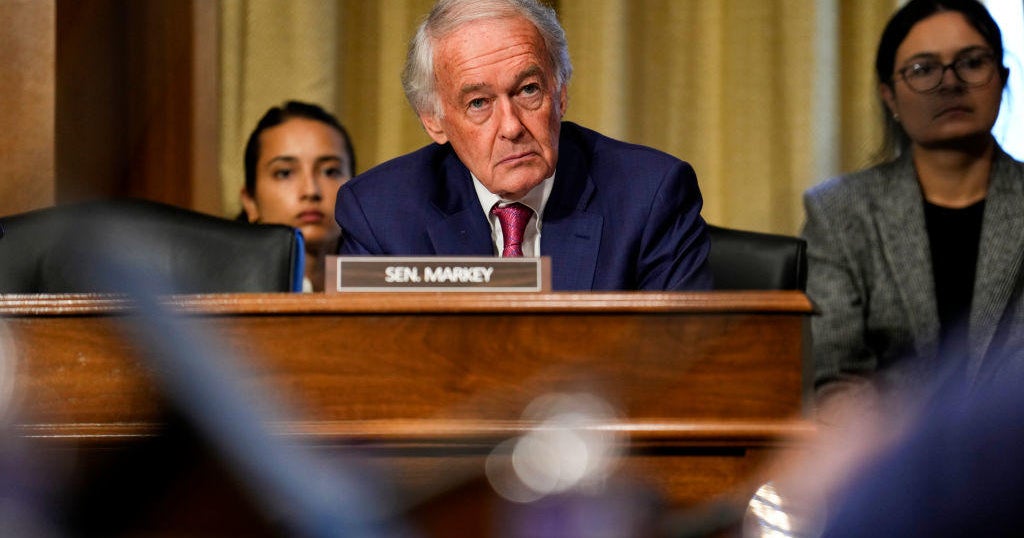
Nine Senate Democrats sent an urgent letter Wednesday imploring the nation’s top auto safety regulator to “accelerate the implementation” of several potentially lifesaving vehicle safety measures called for in the 2021 Infrastructure Investment and Jobs Act, commonly referred to as the bipartisan infrastructure bill.
Among the outstanding provisions was an order from Congress that the National Highway Traffic Safety Administration draft a new standard for the strength of vehicle seats — a measure prompted by a long-running CBS News investigation.
“The agency must still finalize some of its proposed rules and has not yet issued rules for many provisions — rules that are already overdue or nearing their statutory deadline,” the senators wrote in the letter.
Sens. Ed Markey, Richard Blumenthal, Ben Ray Lujan, Elizabeth Warren, Amy Klobuchar, Dick Durbin, Jack Reed, Ron Wyden and Chris Van Hollen sent the letter to NHTSA Deputy Administrator Sophie Shulman asking for response by Dec 15.
The NHTSA does not currently have an administrator to head the agency, a post that has been vacant for most of the last two administrations.
Since 2015, CBS News reports have brought to light longstanding concerns over seatback safety and exposed dire weaknesses within the federal standard, which was created in 1967. The probe found that front seats in vehicles were vulnerable to collapsing in crashes in which those vehicles had been rear-ended, even though the seat construction adhered to national requirements.
NHTSA was given two years to develop new safety standards for seat strength, primarily in an effort to protect children sitting in the back seats of vehicles. Fatal incidents in which front seats collapsed backward in rear-end accidents, and onto kids seated behind them, had already been on the rise for years.
NHTSA missed the deadline, but in July, it announced its plans to potentially update that safety standard. While it sought public comments, the agency has not announced further action.
“It’s unacceptable that backseat passengers – especially children – are still at risk of being killed by a collapsing front seat during a crash,” Markey said in a statement. “After Senator Blumenthal and I passed our Modernizing Seatback Safety Act, and doggedly urged NHTSA to act, I was glad the agency finally issued its proposed rule updating seatback safety standards. But our work is not done yet, and NHTSA must quickly finalize this rule and save lives.”
Kayla Bartkowski/The Boston Globe via Getty Images
Other outstanding safety provisions the senators are seeking status reports on include an annual recall completion list, automatic shutoff for vehicles with keyless ignition systems, setting minimum standards for crash avoidance systems, distracted driver reduction research, updates to hood and bumper standards, a study of existing reporting requirements for vehicle manufacturers regarding potential safety issues, requirements for new vehicles to be equipped with advanced impaired driving prevention technology and a requirement aimed at reducing the likelihood a child is left in a hot car by equipping new vehicles with a system to alert the driver to check rear seats.
CBS News
Susan Smith seeking her freedom 30 years after drowning her 2 young sons in a car in a South Carolina lake

Columbia, S.C. — Susan Smith, the South Carolina mother convicted of killing her two sons by rolling her car into a lake in 1994 with the boys strapped in their seats inside, will ask a parole board for her freedom on Wednesday.
Smith, 53, is serving a life sentence after a jury convicted her of murder but decided not to sentence her to death. Under state law at the time, she is eligible for a parole hearing every two years now that she has spent 30 years behind bars.
South Carolina Department of Corrections via AP
Smith will make her case for freedom to the seven-member parole board by video link from prison. Then she will go offline and her ex-husband and father of the children, as well as the prosecutor at her murder trial, will argue that she remain incarcerated.
Smith killed 3-year-old Michael and 14-month-old Alex because a man she was having an affair with suggested the boys were the reason they didn’t have a future together, prosecutors said.
A decision to grant parole requires a two-thirds vote of board members present at the hearing, according to the state Department of Probation, Parole and Pardon Services. Parole in South Carolina is granted only about 8% of the time and is less likely with an inmate’s first appearance before the board, in notorious cases or when prosecutors and the families of victims are opposed.
How the case unfolded
Smith made international headlines in October 1994 when she said she was carjacked late at night near the city of Union and that a man drove away with her sons inside. Smith, who is white, said the carjacker was Black.
For nine days, Smith made numerous and sometimes tearful pleas asking that Michael and Alex be returned safely. The whole time, the boys were in Smith’s car at the bottom of nearby John D. Long Lake, authorities said.
MARY ANN CHASTAIN / AP
Investigators said Smith’s story didn’t add up. Carjackers usually just want a vehicle, so investigators asked why would they let Smith out but not her kids. The traffic light where Smith said she had stopped when her car was taken would only be red if another car was waiting to cross, and Smith said no other cars were around. Other bits and pieces of the story didn’t make sense.
Smith ultimately confessed to letting her car roll down a boat ramp and into the lake. A re-creation by investigators showed it took six minutes for the Mazda to dip below the surface, while cameras inside the vehicle showed water pouring in through the vents and steadily rising. The boys’ bodies were found dangling upside-down in their car seats, one tiny hand pressed against a window,
Prosecutors said Smith was having an affair with the wealthy son of the owner of the business she worked at. He broke it off because she had the two young sons.
Lou Krasky / AP
Smith’s lawyers said she was remorseful, was suffering a mental breakdown and intended to die alongside her children but left the car at the last moment.
In July 2015, 20 years after her conviction, Smith told The State newspaper in Columbia she never planned to kill them and instead intended to end her own life.
The 1995 trial of the young mother became a national sensation and a true crime touchstone even though it wasn’t televised by a judge who worried about what cameras were doing to the O.J. Simpson murder trial going on at the same time. Her lawyers worked to save her life, noting that Smith’s father had killed himself and that her stepfather was having sex with her along with the owner of the business where she worked.
Unusual actions in prison
From prison, Smith can make phone calls and answer text messages, many coming from journalists and interested men. Those messages and phone calls were released under South Carolina’s open records act, something Smith didn’t initially realize could happen. She said the invasion of her privacy upset her along with the public revelation that she was juggling conversations about the future with several men.
Some men know why she is famous. Others are more coy. One told her he was going to use the dates of her birthday and those of her dead sons when he played the Powerball lottery. Others chatted about their lives and sports. Many promised her a home on the outside and a happy life.
Smith says in some of the messages she still grieves for her children.
“I am really sad today and just want to hang out in the bed. Today is my youngest son’s birthday, he would have been 30 today. Hard to believe,” Smith wrote in August 2023.
Smith also had sex with guards. And she violated prison policies by giving out contact information for friends, family members and her ex-husband to a documentary producer who discussed paying her for her help, according to former prosecutor Tommy Pope.
“The jury believed she got a life sentence and that’s what she should serve,” Pope said last month shortly after the parole hearing was announced.
Pope, who’s now a representative in the South Carolina legislature, told CBS Columbia affiliate WLTX-TV he doesn’t expect Smith to get parole — or want her to.
“She has been continually focused on Susan, not on Michael and Alex, I think Susan’s remorseful, but remorseful that she’s in her circumstances — not remorseful for the pain she caused Michael and Alex, or equally importantly David Smith (the boy’s father) and his family,” he said.
CBS News
Florida Gov. DeSantis’ Canadian drug import plan goes nowhere after FDA approval

Nearly a year after the Biden administration gave Florida the green light to become the first state to import lower-cost prescription drugs from Canada — a longtime goal of politicians across the political spectrum, including President-elect Donald Trump — the program has yet to begin.
Florida Gov. Ron DeSantis hailed the FDA’s approval of his plan in January, calling it a victory over the drug industry, which opposes importation on the grounds that it would lead to a surge in counterfeit medications.
A Florida health official familiar with the importation program told KFF Health News there was no planned date yet for the state to begin importing drugs. The official asked not to be identified because they weren’t authorized to speak publicly about the program.
Florida applied to create an importation program in November 2020, just months after the Trump administration gave states the option. DeSantis, a Republican, complained publicly for years about the pace of the federal approval process under the Biden administration and in 2022 filed suit against the FDA for what he called a “reckless delay.”
Trump touted his administration’s move to bring medicines over the border in a preelection interview published last month by AARP, the advocacy group for older Americans, which supports allowing Americans to buy drugs from Canada. He vowed to “continue my efforts to protect Americans from unaffordable drug prices” in a second term.
It’s not clear whether his second administration will or can do more to help Florida and other states set up programs, because it’s ultimately up to the states to act. Colorado is the only other state that has an importation plan pending with the FDA.
DeSantis administration officials have refused for months to answer questions from KFF Health News about the program. Alecia Collins, deputy chief of staff for the Florida Agency for Health Care Administration, said in October that officials were traveling and unavailable. In mid-November, she said she still had no answers.
DeSantis press secretary Jeremy Redfern said he had been “slammed” since the first week of November and could not answer questions.
FDA spokesperson Cherie Duvall-Jones said she could not answer whether Florida had submitted documents the agency requires before the state can start importing medicines. She referred all questions to the state.
Drug companies typically sell medications for far less in Canada than in the United States, as a result of Canadian government price controls. But because of safety and efficacy concerns, federal law prohibits consumers from buying drugs from outside U.S. borders except in rare cases.
Politicians ranging from conservatives such as DeSantis to liberals such as Sen. Bernie Sanders of Vermont have long pushed for importing lower-cost prescription drugs from Canada.
In 2000, Congress passed a law allowing states to import prescription drugs from north of the border, with the caveat that it could go forward only if the secretary of the Department of Health and Human Services affirmed it was safe. That didn’t happen until 2020, when Trump’s HHS secretary, Alex Azar, made such a declaration.
Since 2022, Azar has been chairman of the board at LifeScience Logistics, a Dallas-based company that Florida is paying millions of dollars to set up its drug importation program, including warehousing its medicines.
Azar on Nov. 13 refused to answer questions from KFF Health News about drug importation, saying he wasn’t authorized to speak on the matter.
Florida’s program would not directly assist consumers at the pharmacy. It’s instead aimed at lowering costs for the state Medicaid program and for the corrections and health departments.
Matthew Baxter, a senior director at Ontario-based Methapharm Specialty Pharmaceuticals, which has contracted with LifeScience to export drugs, would not say whether Methapharm has sent any medicines over the border.
The pharmaceutical industry and the Canadian government oppose U.S. drug importation. Drug companies say importation would increase the risk of counterfeit drugs appearing on U.S. pharmacy shelves, while the government in Ottawa has warned it won’t allow medicines to be exported if Canadians could experience shortages as a result.
Florida’s predicted savings would also be relatively minor. DeSantis estimated the program would save state agencies up to $180 million in its first year. Florida’s annual Medicaid budget tops $30 billion.
Florida identified 14 drugs, including for cancer and AIDS, that it would attempt to import from Canada for its state agencies.
Camm Epstein, a health policy analyst in Saratoga Springs, New York, said drug importation is a seemingly simple concept that resonates with the public, which is why DeSantis and others have turned to the idea as a response to rising drug prices. “It riles up the crowd,” he said. “Who doesn’t want to pay lower drug costs?”
But bringing drugs over the border is complicated because of the FDA’s many requirements, including finding companies to work with — a Canadian exporter and a U.S. importer — and following a process that ensures the drugs are authentic, Epstein said.
“This was, at best, a boondoggle,” he said.
Florida has spent tens of millions of dollars to stand up its drug importation program. The state has already paid LifeScience Logistics $50 million to set up a warehouse to store the medicines. DeSantis noted the costs in his 2022 lawsuit against the FDA.
“Plaintiffs have paid their retained importer and distributor over $24 million thus far — and increasing at the rate of $1.2 million every month — even though not a single prescription pill has been imported, relabeled, or distributed, solely because of the FDA’s idleness,” the state said in its suit.
Florida’s delay may be due to operational challenges, Epstein said. “Predictably, even if they turned on the spigot there would be no flow, because Canada was not going to permit for the supply,” he said.
Colorado and Florida are among at least nine states that have passed laws allowing for Canadian drug importation. Colorado’s 2022 application to the FDA is still pending. In December 2023, Colorado officials released a report noting the state was unable to find a drugmaker willing to sell it medicines from Canada.
KFF Health News is a national newsroom that produces in-depth journalism about health issues and is one of the core operating programs at KFF — the independent source for health policy research, polling and journalism.








